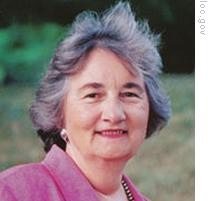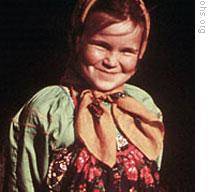2010-1-14
Welcome to AMERICAN MOSAIC in VOA Special English.
(MUSIC)
I'm Doug Johnson.
This week on our program we listen to music from superstar Whitney Houston ...
And answer a question about the Old Believers religious group ...
But first, we meet a new ambassador in Washington whose wants to spread the message that reading is fun.
(MUSIC)
Katherine Paterson
HOST:
If you are over the age of thirty you may not have heard of Katherine Paterson. But if you are under that age chances are good that you have. In fact, you might have read one of her many award-winning books. Or maybe you saw the movie version of her book, "Bridge to Terabithia." Now, the United States government has awarded Katherine Paterson a new job. Mario Ritter has more.
MARIO RITTER:
 |
| Katherine Paterson |
She is only the second person to hold the position. She replaces writer Jon Scieszka, who had served since two thousand eight.
The librarian of Congress, James Billington, said Miz Paterson "represents the finest in literature for young people." He spoke of national as well as international praise for her writing. Mister Billington said she would speak to the importance of reading in the lives of America's young people.
Miz Paterson has written more than thirty books. She is among only five writers to have won two Newbery Medals. These are among the most important children's book awards in the United States. "Bridge to Terabithia" won a Newbery Medal in nineteen seventy-seven. Her book "Jacob Have I Loved" won the award in nineteen eighty-one.
Katherine Paterson's books for children are often quite complex. "Bridge to Terabithia" includes adult themes like depression and death. The book has caused debate because of its place on school library bookshelves. Some parents think it is too adult for young children. Miz Paterson says the idea for the book came from a real life experience. Her son's best friend died in nineteen seventy-four when she was struck by lightning.
Katherine Paterson is seventy-seven. She began writing as a young mother with three children. But she says her interest in writing came as a surprise. As a child she had thought about becoming a Christian religious worker in foreign countries like her parents were.
Katherine Paterson spoke to a gathering of children when she was named ambassador on January fifth in Washington. She said: "Read for your life. Read for your life as a member of a family, as a part of a community, as a citizen of this country and a citizen of the world."
(MUSIC)
Old Believers
HOST:
Our question this week comes from Russia. Aleksey wants to know about the Russian community of Old Believers in the American state of Oregon.
Old Believers is the name used to describe millions of people who rejected reforms to the Russian Orthodox Church in the sixteen hundreds. Old Believers who chose not to accept the reforms were often mistreated or killed. Over time, millions fled Russia. Many fled to Asia, Australia, South America and Europe. Many others came to the United States.
 |
| A photograph by Joanne Mulcahy of a girl belonging to the Old Believers community in Oregon |
Many continue to follow their old traditions and customs. Women wear coverings on their heads and long dresses, tied at the waist. Men are not permitted to shave the hair from their faces.
Old Believers follow special rules governing what they can and cannot eat on different days of the year. For example, they may not be permitted to eat things like dairy products, meat, fish or eggs, or drink alcohol. They also cannot eat off of the same dish that a non-believer has eaten off of. Because of this, many eat at fast food restaurants that serve food in containers that can be thrown away.
Old Believers observe forty religious holidays each year. On these days they are not permitted to go to work or attend school. In Oregon many Old Believers have their own businesses or farms. But a growing number of them work in jobs in the city, especially at furniture factories and sewing companies.
Many Old Believers live in small, private and somewhat closed communities. But the modern world is having an effect. Modern technology is entering their communities.
Many Old Believers watch television and drive cars. And many, especially the young, are reportedly having a harder time trying to hold on to their spiritual and cultural traditions.
(MUSIC)
Whitney Houston
HOST:
Whitney Houston's recent album "I Look to You" marked her long awaited return to the music industry. It opened at the number one position in the United States and Canada. It also appeared in top positions in Australia and five European countries. Now the superstar is preparing for a world concert tour. Here is Shirley Griffith with more about Whitney Houston and songs from her album "I Look to You."
SHIRLEY GRIFFITH:
Music fans around the world are excited about the launch of Whitney Houston's world concert tour. It is to begin in Tokyo, Japan in February. This is her first international concert tour in nearly ten years. Serious personal problems interfered with Houston's award- winning singing career during the past ten years. She abused illegal drugs and had a troubled marriage to singer Bobby Brown. Whitney Houston regained control of her life after being treated at a substance abuse center in California for almost one year.
![[insert caption here] [insert caption here]](https://files.21voa.com/images/201001/houston_210_se.jpg) Also, she ended her marriage to Bobby Brown in two thousand seven. That same year, Whitney Houston joined with her longtime friend and major record company executive Clive Davis to begin recording her album. Here is the title song from "I Look to You."
Also, she ended her marriage to Bobby Brown in two thousand seven. That same year, Whitney Houston joined with her longtime friend and major record company executive Clive Davis to begin recording her album. Here is the title song from "I Look to You."
(MUSIC)
In November, Whitney Houston received the International Artist Award at the two thousand nine American Music Awards. The award has been given only seven times in the thirty-six year history of the awards. After receiving the honor, Houston thanked her family and supporters for believing in her. She also performed this song, "I Didn't Know My Own Strength."
(MUSIC)
We leave you with another hit song by Whitney Houston from her album "I Look to You." She wrote this dance song, "Million Dollar Bill," with singer-songwriter Alicia Keys.
(MUSIC)
HOST:
I'm Doug Johnson. Our program was written by June Simms, Lawan Davis and Caty Weaver, who was also the producer. For transcripts, MP3s and podcasts of our programs, go to 21voa.com. You can also post comments.
Do you have a question about people, places or things in America? Send it to mosaic@voanews.com and we may answer it on this show.
Join us again next week for AMERICAN MOSAIC, VOA's radio magazine in Special English.